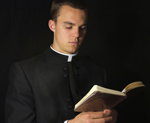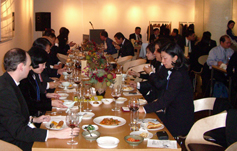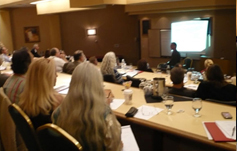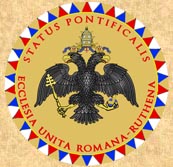|
OFFICE OF
PERSONNEL The United
Roman-Ruthenian Church: A Volunteer-Driven Community of Faith I. Leadership Structure Overview The leadership and staff structure used by the United Roman-Ruthenian Church and Pontifical Imperial State presents a refreshing alternative. Built on the foundation of devotion and community service, the Church relies primarily on volunteers to fulfill its mission. This includes the clergy, most of whom hold secular jobs in the example of St. Paul. Clergymen may also be married or single (read more here). And, many offices can be filled by laymen and laywomen, while some are required to be held by clergy. This model better serves the needs of the Church and its people, and also strengthens the bonds of community across the globe.  "Lay clerics" are men who are admitted to the clergy, but do not require the training required to serve in capacities such as priests, enabling them to fulfill other important, traditional roles in the Church. II. The Role of "Lay Clerics" Many of the offices that must be held by a cleric can be held by a so-called "lay cleric," which is admittedly a somewhat confusing term. This ancient practice that the United Roman-Ruthenian Church maintains simply refers to a clergyman in the minor holy orders. Minor orders, such as acolytes or lectors, are able to perform essential functions within the church leadership structure, assist during liturgies, or lead prayers -- without needed the additional training required to become a priest. This approach allows a diverse range of individuals to contribute to the church’s life, enriching the spiritual experience for everyone involved.   The laity are a vital part of the service of the Church. III. The Vital Role of the Laity However, the majority of positions within the Patriarchal Curia and Pontifical Court of the United Roman-Ruthenian Church—both clerical and non-clerical—can be filled by laymen and laywomen. Participation of the lay faithful in these roles allows for a greater breadth of expertise that laypeople can bring to the table. The complexities of the administration of the Roman-Ruthenian Church and State — management processes, diplomacy, finance, public relations, social outreach, and legal matters — require a diverse skill set. The laity often possess professional experience in these areas and can serve Christ and His Church without being a cleric or a member of a religious order. In this way, the church can benefit from their specialized knowledge and practical insights, ultimately enhancing its mission (see the Vision, Mission Statement, and Core Values here). This also is not a modern trend, but a realization that each person has unique gifts and roles. For to one is given by the Spirit the word of wisdom; to another the word of knowledge by the same Spirit; To another faith by the same Spirit; to another the gifts of healing by the same Spirit; To another the working of miracles; to another prophecy; to another discerning of spirits; to another divers kinds of tongues; to another the interpretation of tongues: But all these worketh that one and the selfsame Spirit, dividing to every man severally as he will. For as the body is one, and hath many members, and all the members of that one body, being many, are one body: so also is Christ. 1 Corinthians 12.8-12)   Many clergy and lay officials of the Church also work in secular jobs. IV. Secular Employment of Clergy and Staff As mentioned, the church’s clergy and officials are typically not on a salary. In fact, clergy and staff are not even considered employees or agents of the United Roman-Ruthenian Church unless individually specified (see also the section on clergy and staff in the legal notices). Clergy and staff typically volunteer their time and energy while also pursuing careers in other professions. This method helps to ensure that the most dedicated individuals are in positions of service. This community-based approach is particularly crucial for the United Roman-Ruthenian Church, which represents an ethno-religious minority scattered across the globe. From Europe to North America and beyond, the Church's presence is felt in numerous communities, each with its own unique cultural fabric and set of circumstances.   The laity are able to connect to their faith through home liturgy. V. Home Liturgy and the Laity Also, given the global nature of the church, the distribution of its clergy can often be thin in areas. However, this challenge has given rise to an innovative solution: at-home liturgy appropriate to be led by the laity and authorized by the Church. These liturgies allow family members to facilitate worship in their own homes, ensuring that the spiritual needs of congregants are met even when a clergyman is not physically present. This approach not only brings families closer together but also empowers laypeople to keep the traditions and practice of their faith alive and active.
[Curia]
|

